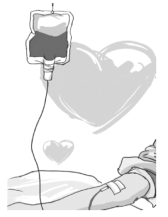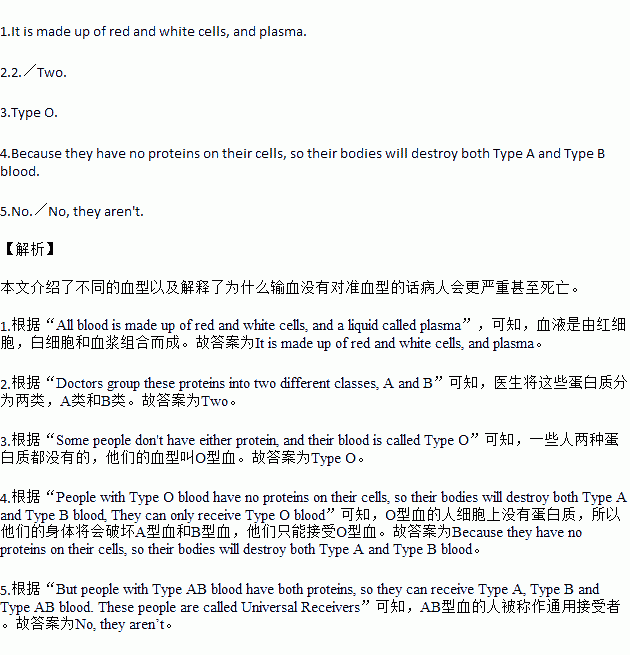题目内容

The Blood Group Alphabet
Sometimes people lose too much blood from injuries or accidents. To save their lives, doctors must replace the lost blood. In an operation called a transfusion, doctors put blood given by healthy people into the veins(静脉)of the sick or injured person. But they must be careful. Although all blood looks the same, there are really different types of blood. Someone getting the wrong type of blood in a transfusion may become very sick or even die.
All blood is made up of red and white cells, and a liquid(液体)called plasma(血浆). It is the red cells that cause blood to be different types. On the outside of the red cells of some people's blood are proteins(蛋白质). Doctors group these proteins into two different classes, A and B. People with the A protein have Type A blood, while people with the B protein have B type blood. If someone happens to have both proteins, that person has Type AB blood. Some people don't have either protein, and their blood is called Type O.
If a person receives a transfusion of the wrong type of blood, the body senses the strange protein on the new blood cells. So the body destroys the new blood, and the patient goes into shock. For example, people with Type A blood will become very sick if they are given Type B protein because their bodies try to destroy the strange Type B protein. People with Type O blood have no proteins on their cells, so their bodies will destroy both Type A and Type B blood. They can only receive Type O blood. But people with Type AB blood have both proteins, so they can receive Type A, Type B and Type AB blood. These people are called Universal Receivers. People of any type can receive Type O blood because it has no protein for the body to fight against. So Type O people are called Universal Donors.
Doctors are always careful to test blood for its type before it is used in a transfusion. Although the wrong type of blood can be harmful, the right type can save a life.
1.What is the blood made up of?
__________________________________________________________________________
2.How many classes do doctors group the proteins into?
__________________________________________________________________________
3.What type of blood does the person have if someone doesn't have either protein?
__________________________________________________________________________
4.Why can people with Type O blood only receive Type O blood?
__________________________________________________________________________
5.Are Type AB people called Universal Donors?
__________________________________________________________________________
 期末冲刺100分创新金卷完全试卷系列答案
期末冲刺100分创新金卷完全试卷系列答案

